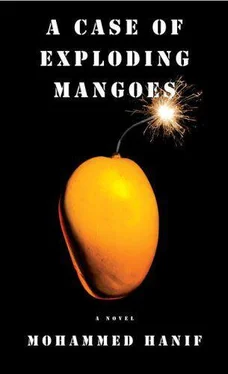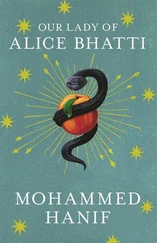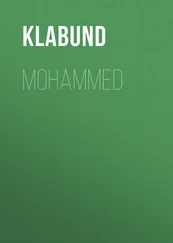“Your jump was perfect. You do that thing beautifully,” General Zia said, making a shapeless flower with his hands in the air. They were in the General’s car going back to the Army House after the post-parade ceremonies. “What if that thing doesn’t open after you jump?”
“Life is in Allah’s hands,” TM said, sitting at the edge of the car seat, “but I pack my own parachute.” General Zia nodded his head in appreciation, expecting to hear more. TM was a man of few words but the silence made him uncomfortable and he volunteered some more information. “I have written a slogan outside our parachute packing cabin: ‘ Life-packing in Progress ’.” This was TM’s first and last literary flourish; his body was more articulate. TM’s body was a tree trunk, permanently stuck in jungle camouflage uniform. His small head was always covered with a crimson beret, cocked over his left ear. His small brown eyes constantly searched for invisible enemies. Even at official receptions, where the rest of the military wore their ceremonial uniforms with golden braids, there was one man behind General Zia in his drab battle fatigues, his eyes darting from a VIP’s face to a waiter to a lady with her hand in her bag. During his six years as General Zia’s Chief of Security, not only had he kept General Zia safe against all visible and invisible enemies, but also conducted him through so many milling crowds that General Zia had started to think of himself as a man of the people.
Now that General Zia had raised his security threat level to red without consulting the Brigadier, he wanted a proper assessment of the situation. Brigadier TM shifted on the edge of the sofa. He was not used to having a conversation with General Zia while sitting down. He tried hard to sit still and concentrate but his eyes kept scanning the presidential crests on the burgundy velvet curtains and the matching Persian rug. Suddenly all the air went out of his lungs and his shoulders collapsed in disbelief. The curtains and the carpets were new. How did all this stuff get here without his knowledge?
“Who wants to kill me?” General Zia asked in a neutral tone, as if enquiring about the lawnmowing arrangements. Brigadier TM caressed the brocade sofa cover with the tips of his fingers and wondered how someone had managed to change it without his security clearance.
The Brigadier was the only man in General Zia’s military staff with round-the-clock access to his working as well as family quarters. He was also the only man in his inner circle who didn’t join Zia for his five daily prayers, a privilege so exceptional that it baffled the others. Anyone who happened to be around General Zia at prayer time was expected to join him, no matter where they were, be it his official plane or the National Command’s bunker. General Zia would look at his watch and everyone, including the peons and politicians who didn’t even know when to stand up or bow during the prayers, would line up with him as if their piety had been waiting for this very moment to be realised. During these prayers, Brigadier TM stood with his back to the congregation, keeping a close eye on all possible access points. In the beginning it weighed on General Zia’s conscience, and he asked TM how he felt about not being able to join him for prayers.
“Duty is worship, sir,” he said. “If I was in a war I would not be expected to leave my gun and pray.” Subsequently, General Zia always remembered to add a few words for TM, reminding Allah that the Brigadier couldn’t offer his prayers because he was on duty.
Brigadier TM’s eyes darted around the room, feeling irritated with the new textures, the different colours. TM knew that security wasn’t just about throwing yourself in front of an assassin’s bullet or pulling out the fingernails of a potential conspirator; it was more about anticipating the subtle shifts in everyday life patterns. “General Akhtar has all the files, sir. Separate files on all the suspects. And on all possible scenarios,” he said distractedly. His eyes were scanning the wall where a portrait of the Founder of the Nation had appeared, a portrait that he had never seen before.
“Those files lie. I am asking you , not General Akhtar. You are my shadow, you should know. You see everyone who comes to meet me; you know every nook and corner in this house. It’s your job to protect me. As your Commander-in-Chief, I demand to know: who are you protecting me from? Who is trying to kill me?” General Zia’s voice rose, his crossed eyes got entangled with each other, two globs of spit escaped his lips, one lodged itself in the General’s moustache and the other was absorbed in the vine and flowers of the Persian rug under his feet.
Brigadier TM was not used to being addressed in this tone. He had always known that General Zia felt threatened by his physical presence when they were by themselves and only felt comfortable when they had company. Brigadier TM was trained in these matters and he immediately knew that this raised voice, this demanding tone, was actually the voice of fear. Brigadier TM had a lot of experience in smelling fear. When you asked them the last question, when they discovered that the time for explanations was over, when they realised that the interrogation had ended and there would be no court trial. It was only then that they raised their voices, they shouted, they pretended they were not scared. But you could smell it just as you can smell it in goats before the slaughter; a bleat on their lips and piss between their legs, like men shouting when you strode into their room and shut the door behind you.
“Everyone,” he said.
General Zia stood up from his sofa in alarm. “What do you mean, Brigadier Tahir Mehdi? Who?” he shouted, and this time his spit was a shower in TM’s face. When General Zia didn’t call you my brother, my son, respected sister and addressed you by your name he was in a bad mood. When he addressed you with your name and rank you had probably already lost that rank. Brigadier TM had no fear of being fired. He would happily go back to training his boys and doing precision para jumps. General Zia knew about this because, in a rare moment, TM had confessed to General Zia that there were only a few bones left in his body that he hadn’t broken in the pursuit of his passion. He had seemed very proud.
“I suspect everyone. Even my own boys.”
“Your commandos? They are here twenty-four hours a day.”
“I send them back to their units every six weeks and get new ones. You might have noticed. There is no point trusting anyone, sir. Indira Gandhi, what happened?”
A shudder ran through General Zia. Indira had been gunned down by her own military bodyguards while taking a stroll in her own garden. General Zia had to go to India to attend her funeral, where he saw at first hand the abomination that was the Hindu religion. They built a pyre of wood, poured some melted butter over it and then Indira Gandhi’s own son lit the flame. General Zia had stood there watching as Indira’s body, draped in a white cotton sari, caught fire. At one point it seemed she was going to get up and run away but then her skull exploded. The General thanked Allah for giving them Pakistan so their children didn’t have to witness this hell on earth every day.
“How do you choose these boys? Why six weeks? Why can’t they get any ideas before six weeks?”
“Because of their families; we take care of them for six weeks. I also run background checks. No homos. Communists. No news junkies. They wouldn’t be around you.”
“You mean they can get ideas by reading newspapers? Have you seen our newspapers? I think you need to revise your guidelines.”
“Any man who has the ability to read a newspaper cannot have the will to throw himself between you and your assassin’s bullet,” said Brigadier TM. He was still trying to solve the sofa-curtain-carpet-portrait mystery.
Читать дальше












